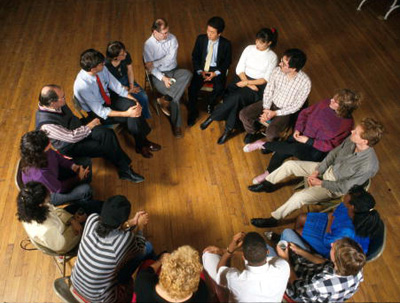The views expressed in our content reflect individual perspectives and do not represent the authoritative views of the Baha'i Faith.
I’m from a family that has an addiction problem, so I have greatly benefited from attending twelve-step self-help meetings for the past twenty years. In fact, my journey from atheism to faith began as a result of my involvement in a twelve-step program, which prepared me to appreciate the beauty and vision of the Baha’i Faith.
Many people turn to various harmful substances and behaviors to numb physical and emotional pain, and to distract themselves from inner emptiness and confusion. This negatively affects their lives — and the lives of their family members. For about the last eighty years, people struggling with addictions have found solutions in recovery programs based on the Twelve Steps of Alcoholics Anonymous. These programs offer spiritual practices that lead to sobriety and serenity. Baha’is can benefit from learning about these programs, especially those Baha’is whose lives have been affected by addiction and trauma. At the same time, the Baha’i Faith has a lot to offer “twelve-steppers” who strive for spiritual growth and would like to take part in a worldwide community committed to the unity and the progress of humankind.
Twelve-step programs consist of people who meet together regularly to discuss a common problem such as alcoholism or drug addiction. The members share their experience, strength and hope about their efforts to recognize their powerlessness over an addictive substance or behavior, or a family member’s addiction, and to seek spiritual growth as a way to recover. Having had a spiritual awakening as a result of working the Twelve Steps, they try to carry the message to others who still suffer. In doing so, the members of these programs feel increasingly connected to God, to themselves, and to their families and communities.
As a twelve-stepper myself, I’ve found many similarities between the Baha’i Faith and twelve-step programs. For example, both encourage spiritual growth through self-knowledge, and both have what I would call an open-ended understanding of God. Twelve-step meetings welcome people of all faiths, rely on the program’s literature for guidance, and encourage members to find a Higher Power they can turn to for help.
Baha’is also welcome members of all religions (or no religion at all) to meetings, and the Baha’i Writings refer to God as an “unknowable essence” Who loves us and provides us with guidance through sacred Scripture. The First Step of Alcoholics Anonymous states that, “We admitted we were powerless over alcohol—that our lives had become unmanageable.” Similarly, Baha’is admit powerlessness each day with a short prayer revealed by Baha’u’llah, the Prophet-Founder of the Baha’i Faith, that begins:
I bear witness, O my God, that Thou has created me to know Thee and to worship Thee. I testify, at this moment, to my powerlessness and to Thy might, to my poverty and to Thy wealth… – Baha’i Prayers, p. 133.
Indeed, both communities use prayer to overcome willful and self-destructive instincts, and both encourage meditation without prescribing any particular method. Twelve-steppers and Baha’is try to abstain from backbiting, criticism, and disunity, and both learn the value of service to humanity as the surest path to serenity.
I also happily found some striking similarities in the organizational models of the twelve-step programs and the Baha’i Faith. Both spiritual communities focus on unity, and follow a “servant-leadership” model, democratically electing leaders to serve the membership. Both communities support themselves financially, without outside funds or influence. The twelve-step programs use “attraction rather than promotion” to spread the message to potential newcomers; Baha’is also don’t proselytize, and tend to talk about their religion only if others show an interest.
 Some differences between the Baha’i Faith and the twelve-step programs exist, but these weren’t deal-breakers for me. For example, A.A. and Al-Anon target only those affected by alcoholism, while the Baha’i Faith seeks to unify and heal humanity as a whole. The Twelve Steps themselves are referred to in the program as suggestions, while Baha’is see the Teachings of Baha’u’llah as Divine prescriptions. Nonetheless, many twelve-steppers believe in the Baha’i concept of the fundamental unity of all religions, and don’t have any difficulty with the Baha’i idea that God has always provided divine Teachings to humanity through a succession of Messengers including Moses, Zoroaster, Buddha, Krishna, Jesus, Muhammad, and — most recently — Baha’u’llah.
Some differences between the Baha’i Faith and the twelve-step programs exist, but these weren’t deal-breakers for me. For example, A.A. and Al-Anon target only those affected by alcoholism, while the Baha’i Faith seeks to unify and heal humanity as a whole. The Twelve Steps themselves are referred to in the program as suggestions, while Baha’is see the Teachings of Baha’u’llah as Divine prescriptions. Nonetheless, many twelve-steppers believe in the Baha’i concept of the fundamental unity of all religions, and don’t have any difficulty with the Baha’i idea that God has always provided divine Teachings to humanity through a succession of Messengers including Moses, Zoroaster, Buddha, Krishna, Jesus, Muhammad, and — most recently — Baha’u’llah.
Twelve-step programs offer simple and effective ways to recover from the effects of addictions. Because of many shared principles and practices, twelve-steppers will find in the Baha’i Faith a warm, inviting atmosphere where they can explore spiritual growth, investigate all faiths, and extend their service work by making their vision “world-embracing.” In my own case, twelve-step recovery makes me a better Baha’i — and being a Baha’i helps me to work a more effective and spiritual twelve-step program.
















Comments
Sign in or create an account
Continue with Googleor